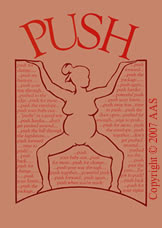I've been reading an interesting Save the Children document.
http://www.savethechildren.org/publications/mothers/2006/
SOWM_2006_final.pdf
Some alarming statistics have me awake wondering .....
Four million babies are born in the United States every years. Four million is ALSO the same number of babies who die within the first month of life around the world. Ugly debating in this country about the small numbers of neonatal deaths and insignificant numbers between home and hospital birth make me feel as badly as if I were to stuff myself at a huge smorgasbord while listening to my friend's slide show of her trip to an African village.
Three million of the 4 die in the first week and 1/2 of those are within the first 24 hours.
Tetanus, infections, diarrhea cause 36% of the deaths. Poor care during childbirth is also a factor -- most women have no access to any prenatal or medical care. Prematurity complications account for 27% and asphyxia accounts for 23%. (Listening to the ranting here in the US, this seems like a pretty small number considering the importance of prenatal nutrition and lifestyle that is attributed to fewer problems in US births.) Sixty to 80% weigh less than 5#. In India death of the poor babies is fifty-six percent higher than the rich. In Bolivia, Niger, Peru and Viet Nam the death rate of babies born in rural areas is fifty percent higher than those born in urban areas.
According to the document, 3 million of the four million neonatal deaths could be stopped by addressing the disease and health conditions. Makes me think of recent claims I have read about how obstetric medicine is responsible for the decreased neonatal mortality rates in the US, when we all know that that it is antibiotics, good nutrition, clean water, health care that addresses tetanus, infections, and diarrhea is the real reason for the difference in mortality rates from 100 years ago. The disparity between rich and poor and white and non-white, and rural versus urban exist in every state in the US. In Missouri rural women travel hours to birth in the larger towns and cities -- this means higher inductions and planned csections, AND, increasing prematurity and possibility related to being born "under the influence" of narcotics, an ever increasing methamphetamine problem. All of these numbers seem to be reflective of the conditions in the US as well. Non-white women and babies are four times more likely to die than white women -- in the US in twenty-first century.
What if we were able to provide the necessary tools and supplies to support third world countries to overcome the disease and poor water and nutrition conditions and lower the neonatal death from to one million babies world wide (from 4 million). What would happen to all of these babies? Is there a natural process going on here?
What is happening to babies in our own society as stigma of out-of-wedlock ('scuse me if that is not politically correct) no longer exists? I have some serious questions -- for years now. In 1996 my ex and I once went with a child psychiatrist to an ACLU meeting to discuss this the rights of baby's to a quality life versus the rights of a woman to reproduce (indiscriminately when unable to care for children). I was directing a program to help low-income women getting off welfare to stay in college and he was seeing young women in the family practice clinic having multiple babies.
I hope some brave souls will engage in a dialog about this. It has been on my mind and heart for many years as I worked in many levels of social systems to care for children and women. One of my concerns has been the inability of women to care for a baby and the need for state and social service intervention. A local social service organization where I used to live does a yearly television campaign to solicit donations for the poor babies. They ask for donations of diapers, formula, blankets, tshirts, and socks and I wonder what are we doing??
Don't get me wrong -- I've been accused more than once of being a "bleeding heart liberal" and as an advocate and activist for those who depend upon the systems I have been accused of "wearing rose-colored glasses". But, as I studied the pre and perinatal psychology, brain imprinting, and fetal programming literature I became more and more concerned about the long term consequences of poor prenatal care and parenting early on. The United States while the weathiest country in the world has glaring disparity of wealth and serious poverty issues. More and more, I believe that if one is unable to even buy diapers and formula, perhaps one ought to not be making babies, and perhaps, our society has an obligation to do something. Many will think that is wrong. Why is a heap of an old, broken down social service and foster care system where children are more likely to be harmed and failed seen as ok, and millions upon millions of dollars poured into it? Children who are failed by their caregivers to have the basic love and nurturing are children who rarely catch up. Living in environments where poverty, violence, and addiction exist prevents those adults from being able to provide the necessities of love, time, and attention regardless of poverty. If you have never been on the "inside" of these social service systems, you can not imagine the heart break of watching the large number of human beings grow up in the conditions they do. I previously posted links to the site www.trauma-pages.org research on the brain development in childhood -- when our biological computer is being programmed.
So, I ask for our own children here in the US who live in abject poverty and violence, what are the rights of the baby? What is the responsibility of a society to expect and ensure that it's babies are born into environments where the mother is able to care for her baby. Of course, I am thinking of many of the children born in the US as well as in third world countries. When is the right of the human baby as important or more important than the reproductive rights of the woman?
Is it really wrong for society to look at determining who is able to care for a baby? What about the rights of a human being to be born to a woman and couple who are capable of providing a healthy and safe prenatal period? What are the rights of a baby to be born to a woman and couple who are connected, nourished, committed, prepared and capable of caring for another human being's needs. Doesn't a human being have a right to be born to people who are emotionally, physically, mentally, and spiritually prepared and able to parent him or her? To provide a safe home, proper nourishment, emotional and spiritual nurturing. Is it really wrong, a violation of her civil liberties to wonder if a baby is what a girl or woman really needs? Are we really caring for women and their rights by not addressing this?
The Other Side of the Glass
Part One was officially released June 2013 in digital distribution format.
To purchase to to www.theothersideoftheglass.com
If you were a donor and want to download your copy send an email to theothersideoftheglassfilm@gmail.com.
The trailer
Monday, February 05, 2007
Subscribe to:
Post Comments (Atom)
"Soft is the heart of a child. Do not harden it."
A public awareness reminder that things that happen behind the scenes, out of our sight, aren't always as rosy as we might think them to be. Perhaps its a restaurant cook who accidentally drops your burger
on the floor before placing it on the bun and serving it to you. Here it's an overworked apathetic (pathetic) nurse giving my newborn daughter her first bath.
Please comment and rate this video, so as to insure that it is viewed as widely as possible, perhaps to prevent other such abuse. -- The mother who posted this YouTube. How NOT to wash a baby on YouTube
Are you going to try to tell me that "babies don't remember?" There is no difference to this baby's experience and the imprinting of her nervous system/brain and one that is held and cleaned by the mother or father either at the hospital or at home?
By the way, this is probably NOT the baby's first bath. The nurse is ungloved. Medical staff protocol is that they can't handle a baby ungloved until is has been bathed (scrubbed if you've seen it) because the baby is a BIO-HAZARD -- for them. Never mind that the bio-hazard IS the baby's first line of defense against hospital germs.
Missouri Senator Louden Speaks
Finally, A Birth Film for Fathers
Part One of the "The Other Side of the Glass: Finally, A Birth Film for and about Men" was released June, 2013.
Through presentation of the current research and stories of fathers, the routine use of interventions are questioned. How we protect and support the physiological need of the human newborn attachment sequence is the foundation for creating safe birth wherever birth happens.
Based on knowing that babies are sentient beings and the experience of birth is remembered in the body, mind, and soul, fathers are asked to research for themselves what is best for their partner and baby and to prepare to protect their baby.
The film is designed for midwives, doulas, and couples, particularly fathers to work with their caregivers. Doctors and nurses in the medical environment are asked to "be kind" to the laboring, birthing baby, and newborn. They are called to be accountable for doing what science has been so clear about for decades. The mother-baby relationship is core for life. Doctors and nurses and hospital caregivers and administrators are asked to create protocols that protect the mother-baby relationship.
Men are asked to join together to address the vagaries of the medical system that harm their partner, baby and self in the process of the most defining moments of their lives. Men are asked to begin to challenge the system BEFORE they even conceive babies as there is no way to be assured of being able to protect his loved ones once they are in the medical machine, the war zone, on the conveyor belt -- some of the ways that men describe their journey into fatherhood in the medicine culture.
Donors can email theothersideoftheglassfilm@gmail.com to get a digital copy.
Through presentation of the current research and stories of fathers, the routine use of interventions are questioned. How we protect and support the physiological need of the human newborn attachment sequence is the foundation for creating safe birth wherever birth happens.
Based on knowing that babies are sentient beings and the experience of birth is remembered in the body, mind, and soul, fathers are asked to research for themselves what is best for their partner and baby and to prepare to protect their baby.
The film is designed for midwives, doulas, and couples, particularly fathers to work with their caregivers. Doctors and nurses in the medical environment are asked to "be kind" to the laboring, birthing baby, and newborn. They are called to be accountable for doing what science has been so clear about for decades. The mother-baby relationship is core for life. Doctors and nurses and hospital caregivers and administrators are asked to create protocols that protect the mother-baby relationship.
Men are asked to join together to address the vagaries of the medical system that harm their partner, baby and self in the process of the most defining moments of their lives. Men are asked to begin to challenge the system BEFORE they even conceive babies as there is no way to be assured of being able to protect his loved ones once they are in the medical machine, the war zone, on the conveyor belt -- some of the ways that men describe their journey into fatherhood in the medicine culture.
Donors can email theothersideoftheglassfilm@gmail.com to get a digital copy.
Buy the film at www.theothersideoftheglass.com.
The film focuses on the male baby, his journey from the womb to the world and reveals healing and integrating the mother, father, and baby's wounded birth experience. The film is about the restoring of our families, society, and world through birthing loved, protected, and nurtured males (and females, of course). It's about empowering males to support the females to birth humanity safely, lovingly, and consciously.
Finally, a birth film for fathers.
The film focuses on the male baby, his journey from the womb to the world and reveals healing and integrating the mother, father, and baby's wounded birth experience. The film is about the restoring of our families, society, and world through birthing loved, protected, and nurtured males (and females, of course). It's about empowering males to support the females to birth humanity safely, lovingly, and consciously.
Finally, a birth film for fathers.
What People Are Saying About the FIlm
Well, I finally had a chance to check out the trailer and .. wow! It's nice that they're acknowledging the father has more than just cursory rights (of course mom's rights are rarely acknowledged either) and it's great that they're bringing out the impact of the experience on the newborn, but I'm really impressed that they're not shying away from the political side.
They are rightly calling what happens in every American maternity unit, every day, by its rightful name - abuse. Abuse of the newborn, abuse of the parents and their rights, abuse of the supposedly sacrosanct ethical principal of patient autonomy and the medico-legal doctrine of informed consent, which has been long ago discarded in all but name. I love it!
In the immortal words of the "shrub", "bring it on!" This film needs to be shown and if I can help facilitate or promote it, let me know.
Father in Asheville, NC
Thanks for sharing this. It was very touching to me. I thought of my brother-in-law standing on the other side of the glass when my sister had to have a C-section with her first child because the doctor was missing his golf date. I'll never forget his pacing back and forth and my realizing that he was already a father, even though he hadn't been allowed to be with his son yet.
Margaret, Columbia, MO
They are rightly calling what happens in every American maternity unit, every day, by its rightful name - abuse. Abuse of the newborn, abuse of the parents and their rights, abuse of the supposedly sacrosanct ethical principal of patient autonomy and the medico-legal doctrine of informed consent, which has been long ago discarded in all but name. I love it!
In the immortal words of the "shrub", "bring it on!" This film needs to be shown and if I can help facilitate or promote it, let me know.
Father in Asheville, NC
OMG'ess, I just saw the trailer and am in tears. This is so needed. I watch over and over and over as fathers get swallowed in the fear of hospitals birth practice. I need a tool like this to help fathers see how very vital it is for them to protect their partner and baby. I am torn apart every time I see a father stand back and chew his knuckle while his wife is essentially assaulted or his baby is left to lie there screaming.
Please send me more info!!!!
Carrie Hankins
CD(DONA), CCCE, Aspiring Midwife
720-936-3609
Thanks for sharing this. It was very touching to me. I thought of my brother-in-law standing on the other side of the glass when my sister had to have a C-section with her first child because the doctor was missing his golf date. I'll never forget his pacing back and forth and my realizing that he was already a father, even though he hadn't been allowed to be with his son yet.
Margaret, Columbia, MO
In case you don't find me here
Soon, I'll be back to heavy-duty editing and it will be quiet here again. I keep thinking this blog is winding down, and then it revives. It is so important to me.
I wish I'd kept a blog of my journey with this film this past 10 months. It's been amazing.
I have a new blog address for the film, and will keep a journal of simple reporting of the journey for the rest of the film.
www.theothersideoftheglassthefilm.blogspot.com
I'll be heading east this week to meet with a group of men. I plan to post pictures and clips on the film blog.
I'll keep up here when I can -- when I learn something juicy, outrageous, or inspiring related to making birth safer for the birthing baby.
I wish I'd kept a blog of my journey with this film this past 10 months. It's been amazing.
I have a new blog address for the film, and will keep a journal of simple reporting of the journey for the rest of the film.
www.theothersideoftheglassthefilm.blogspot.com
I'll be heading east this week to meet with a group of men. I plan to post pictures and clips on the film blog.
I'll keep up here when I can -- when I learn something juicy, outrageous, or inspiring related to making birth safer for the birthing baby.
Review of the film
Most of us were born surrounded by people who had no clue about how aware and feeling we were. This trailer triggers a lot of emotions for people if they have not considered the baby's needs and were not considered as a baby. Most of us born in the US were not. The final film will include detailed and profound information about the science-based, cutting-edge therapies for healing birth trauma.
The full film will have the interviews of a wider spectrum of professionals and fathers, and will include a third birth, at home, where the caregivers do a necessary intervention, suctioning, while being conscious of the baby.
The final version will feature OBs, RNs, CNMs, LM, CPM, Doulas, childbirth educators, pre and perinatal psychologists and trauma healing therapists, physiologists, neurologists, speech therapists and lots and lots of fathers -- will hopefully be done in early 2009.
The final version will include the science needed to advocated for delayed cord clamping, and the science that shows when a baby needs to be suctioned and addresses other interventions. Experts in conscious parenting will teach how to be present with a sentient newborn in a conscious, gentle way -- especially when administering life-saving techniques.
The goal is to keep the baby in the mother's arms so that the baby gets all of his or her placental blood and to avoid unnecessary, violating, and abusive touch and interactions. When we do that, whether at home or hospital, with doctor or midwife, the birth is safe for the father. The "trick" for birthing men and women is how to make it happen in the hospital.
The full film will have the interviews of a wider spectrum of professionals and fathers, and will include a third birth, at home, where the caregivers do a necessary intervention, suctioning, while being conscious of the baby.
The final version will feature OBs, RNs, CNMs, LM, CPM, Doulas, childbirth educators, pre and perinatal psychologists and trauma healing therapists, physiologists, neurologists, speech therapists and lots and lots of fathers -- will hopefully be done in early 2009.
The final version will include the science needed to advocated for delayed cord clamping, and the science that shows when a baby needs to be suctioned and addresses other interventions. Experts in conscious parenting will teach how to be present with a sentient newborn in a conscious, gentle way -- especially when administering life-saving techniques.
The goal is to keep the baby in the mother's arms so that the baby gets all of his or her placental blood and to avoid unnecessary, violating, and abusive touch and interactions. When we do that, whether at home or hospital, with doctor or midwife, the birth is safe for the father. The "trick" for birthing men and women is how to make it happen in the hospital.








No comments:
Post a Comment